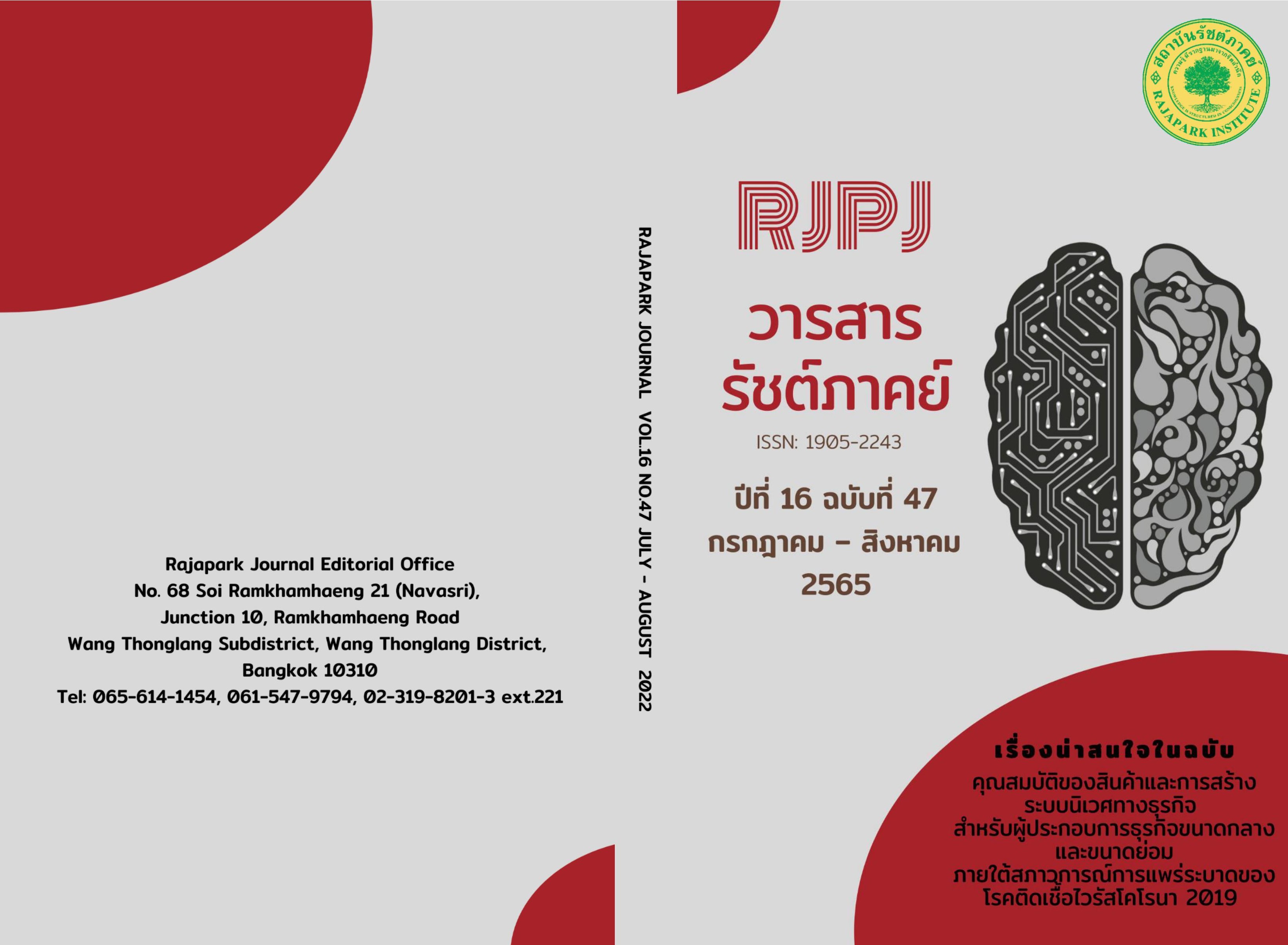Educational Institution Administrators in the Era of COVID-19
Main Article Content
Abstract
This article aimed to present an educational management approach to prepare for a new normal life in the era of the COVID-19 crisis. Educational institution administrators, who are considered as people who have to manage education in a new lifestyle that is different from the past, due to the environment, the epidemic situation of the coronavirus (COVID-19), until the way of life of people in society has changed to a new way. Social distance is required to wear a mask, take better care of your own health, etc. Executives must have leadership skills that are prepared to deal with changing situations, such as educational management that is in line with the new way of life, such as preparing for online teaching through various electronic devices, preparing teaching materials that are interesting and caring about current education, and managing teaching and learning management to be successful and effective. There must be joint planning from administrators, faculty members, and educational personnel in order to manage new teaching methods to be of quality and in line with the new way of life.
Article Details

This work is licensed under a Creative Commons Attribution-NonCommercial-NoDerivatives 4.0 International License.
Views and opinions appearing in the Journal it is the responsibility of the author of the article, and does not constitute the view and responsibility of the editorial team.
References
Barnard, C. (1968). The functions of the executive. Harvard University.
Campbell, D. F., Johnston, R. W., Campbell, G. S., McClain, D., & Macaluso, J. F. (1983). The microbiology of raw, eviscerated chickens: A ten-year comparison. Poultry Science, 62, 437-444.
Certo, S. C. (2008). Modern management (11th ed.). Prentice Hall.
Dale, E. (1973). Management: Theory and practice. McGraw-Hill.
Dave. (2007, February 1). Characteristics of Innovative Leaders. http://innovativeleadership.blogspot.com/2007/02/innovative-leadershipprogress-at-warp.html
Drucker, P. F. (1954). The practice of management. Harper & Row.
Duangchurn, P. (2020). The New Normal in Educational Administration After the COVID-19 Crisis. Journal of Arts Management, 4(3), 783-795.
Gorton, R. A. (1983). School leadership and administration: Important concepts. McGraw-Hill.
Gregg, R. T. (1957). The administrative process. In R. F. Campbell, & R. T. Gregg (Eds.), Administrative behavior in education (pp. 269-317). Harper and Brothers.
Hoy, W., & Miskel, C. (2001). Educational administration: Theory, research, and practice (6th ed.). McGraw-Hill.
Koontz, H. (1972). Analysis of Managerial Functions. McGraw-Hill.
Krajewski, R. J., Martin, J. S., & Walden, J. C. (1983). The Elementary School Principalship: Leadership for the 1980s. Holt, Rinehart, & Winston.
Mittrapan, C. (2020). Adjust Your Lifestyle, New Life to Accept the New Normal After the COVID-19 crisis. https://www.etda.or.th/content/new-normal-after-COVID-19.html
Mosley, D.C., Pietri, P.H., & Megginson, L.C. (1996). Management Leadership in Action (5th ed). Harper.
Pangthai, S., Muktarakosa, S., & Maneewong, S. (2019). A Model Developing Creative Leadership of Administrators in Khonkaen Primary Educational Service Area Office 2. Jourmal of MCU Nakhondhat, 6(7), 3299-3313.
Patiphan, K., Podaphon, C., & Sereewat, W. (2013). Creative Leadership. Nana Wittaya.
Petersen, E., Plowman, E. G., & Trickett, J. M. (1962). Business organization and management. Irwin.
Phaengthai, S. (2016). The Role of Educational Institution Administrators in the 21st Century. Journal of the Graduate College of Asia, 6(1), 7-11.
Rojwatanaboon, O. (2011). Developing an Innovative Leader Model[Doctoral Dissertation, National Institute of Development Administration].
Rungruang, S., & Chantuk, T. (2017). Leadership Development Models for Creativity Motivation. Veridian E-Journal, Humanities, Social Sciences and Arts, 10(1), 29-46.
Runcharoen, T. (2011). Learning Person Development. Khaofang.
Sargent, C. G., & Belisle, E. L. (1955). Educational administration: Cases and concepts. Houghton Mifflin.
Pangthai, S., Muktarakosa, S., & Maneewong, S. (2019). A Model Developing Creative Leadership of Administrators in Khonkaen Primary Educational Service Area Office 2. Jourmal of MCU Nakhondhat, 6(7), 3299-3313.
Sergiovanni, T. J., & Carver, F. D. (1980). The school executive: A theory of administration (2nd ed.). Harper & Row.
Simon, H. A. (1976). Administrative behavior: A study of decision-making processes in administrative organization (3rd ed.). The Free Press.
Sinlarat, P., Kamdit, S., Manusawat, C., Wisritapa, W., & Misaen, N. (2016). Education 4.0 is more than Education (3rd ed.). College of Education Graduate Business University.
Sriakkaralab, W., Kongklai, J., & Jesadalak, W. (2016). The Development of a Model for Strengthening Creativity through cognitive coaching process in Public Administration and Services. Veridian E-Journal, Humanities, Social Sciences and Arts, 9(2), 339-357.
Stoll, L., & Temperley, J. (2009). Creative leadership: A challenge of our times. School Leadership and Management, 29(1), 63-76.
Sucharitkul Juthathip, (2019). Transformational Leadership among Administrators of the Local Government Administration in Thailand 4.0 Era: A Case Study of Phuket Local Government Administration. Journal of MCU Nakhondhat, 6(10), 4930-4943.
The Reader’s Digest Encyclopedia Dictionary. (1964). Reader’s Digest Association. The Reader’s Digest Encyclopedia Dictionary.
Vejyalak, N. (2017). Leadership in Management. Chulalongkorn University.
Yukl, G. (2006). Leadership in organizations (6th ed.). Pearson Education.


